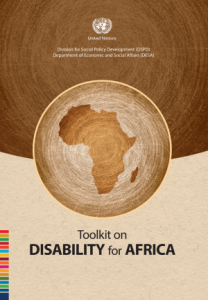- Main page: Handbook for Parliamentarians
- Habilitation and rehabilitation
- Accessibility
- Education
- The Cost of inclusive education
- Work and employment
- Legal capacity and supported decision-making
WORK AND EMPLOYMENT
Employment (article 27) provides many opportunities for social participation, from economic independence, to family formation, to a sense of contributing to the national economy. But in every society, persons with disabilities have not been fully integrated into the labour market. Most are either unemployed or have been dissuaded from actively seeking work. Among those who are working, many are underemployed, paid below minimum wage, and work below their capabilities. This lack of economic participation has a significant impact on the lives of persons with disabilities, as they are then unable to earn an adequate standard of living (article 28) and to live independently in the community (article 19).
In all regions of the world there is a sizeable gap between the working conditions and employment trends of persons with disabilities and those without a disability. All too often, persons with disabilities are dependent upon begging, charity and welfare, rather than upon meaningful employment, for their livelihoods.
Employers often resist hiring persons with disabilities, or simply discard their job applications, believing they will be unable to accomplish their tasks and/or that it would be too expensive to hire them. This attitude is rooted in fear and stereotyping, and focuses more on the disability than on the abilities of the individual. Empirical evidence, however, indicates that persons with disabilities have high performance ratings and job-retention rates, and better attendance records than their non-disabled colleagues. In addition, the cost of accommodating workers with disabilities is often minimal, with most requiring no special accommodation at all. Studies have shown that other benefits accrue to those who employ persons with disabilities, including improved workforce morale and increased customer goodwill.
In developing countries, most workers with disabilities are employed in the informal sector, where labour protection is limited and work is unstable. It is estimated that between half and three quarters of all non-agricultural workers in developing countries are employed in the informal sector. In Africa, the percentage of informal workers ranges from 48 per cent in North Africa to 78 per cent in sub-Saharan Africa. Self-employment outside of agriculture accounts for 60 to 70 per cent of informal work. Women with disabilities are even less likely than men with disabilities to be employed, and they earn less when they are employed.
Many countries do not have legislation to promote and protect the rights of workers with disabilities. This makes it possible to discriminate against persons with disabilities in the workplace, hindering their access to the labour market. Their absence in the economy is also rooted in the lack of education and training opportunities available to persons with disabilities in their younger years.
HOW ACCESS TO EDUCATION AND TRANSPORT AFFECTS ACCESS TO EMPLOYMENT
When persons with disabilities are not integrated into policies and planning related to transport, physical infrastructure and education systems, they are often excluded from employment. Even if jobs are available to persons with disabilities, those individuals might find that there are other obstacles to employment: they might not have received the required education; they might not have access to job listings in appropriate formats; and there might be no accessible transport to and from work. All of these factors could dissuade qualified persons with disabilities from seeking employment.
Implementation of the Convention’s provisions on work and employment will directly affect the approximately 470 million men and women of working age who have disabilities. The Convention enumerates States’ obligations to ensure the legal right of persons with disabilities to earn a living through work that they voluntarily choose or accept, and to prohibit discrimination based on disability in all forms of employment (article 27 (1)). While promoting the opening of labour markets for persons with disabilities, the Convention also recognizes the importance of self-employment, which is particularly relevant in developing countries (article 27 (1) (f)). The Convention also provides for reasonable accommodation (article 27 (1) (i)) and promotes policies and programmes, including affirmative action, that encourage employers to recruit persons with disabilities (article 27 (1) (h)]).
ENSURING EMPLOYMENT OPPORTUNITIES
Disability can sometimes affect an individual’s ability to carry out a job in the usual or customary way. The obligation to make a reasonable accommodation on a case-by-case basis, or the right to be accommodated, is included in the Convention’s provisions on work and employment.
Provisions on reasonable accommodation in the context of employment have been adopted in different parts of the world but will be new to many countries. Both employers and employees may need guidance and assistance in identifying what reasonable accommodations are needed.
Affirmative-action measures, such as employment quotas, seek to promote equal opportunity and are aimed at overcoming structural disadvantages that target certain groups. Unlike reasonable accommodation, such measures are not intended to meet the needs of individuals. Affirmative-action measures are temporary and are intended to last only until the structural disadvantages have been overcome, either through compensation or by creating a more equitable system.
Although employers are often thought of as private-sector entities, in many countries, particularly developing countries, the Government is the employer of choice and the largest employer. Since the Convention requires Governments to make appropriate reasonable accommodations to hire more job-seekers with disabilities at all levels, the Government can serve as a model for private-sector employers.
Many countries have some type of employment quota for persons with disabilities, at least for positions in the public sector. These quotas range between 2 and 7 per cent, but compliance rates are generally low, between 50 and 70 per cent. Quotas normally apply to medium to large firms and non-compliant enterprises are usually fined. While such fines have not improved compliance rates, they do provide additional funds that are often spent on employment-related programmes for persons with disabilities. States parties could benefit from the creation of bridge programmes for people making the transition from social-welfare schemes to the open labour market.
The Convention’s provisions on work and employment cover persons with disabilities in all stages of employment, including those seeking employment, those advancing in employment, and those who acquire a disability during employment and who wish to retain their jobs. The right to exercise labour and trade union rights is also promoted in the Convention (article 27 (1) (c)). States are also legally obligated to ensure that persons with disabilities are not held in slavery or servitude and are protected on an equal basis with others from forced or compulsory labour (article 27 (2)).
In practical terms, States must ensure that persons with disabilities apply for jobs alongside persons without disabilities, that they are protected from discrimination, and that they have the same rights as others in the workplace and equal opportunities for career advancement. Governments, workers’ and trade unions, employers, and representatives of persons with disabilities can work together to ensure the social and economic integration of persons with disabilities. Recommended actions will vary according to the level of economic development within the country.
BIG BUSINESS BACKS INCLUSION
Business and Disability is a European network that grew out of the group of corporate partners formed during the European Year of People with Disabilities 2003. The network promotes disability-inclusion initiatives and encourages the exchange of ideas among business and political actors and individuals with disabilities. Business and Disability is committed to the inclusion of persons with disabilities in all aspects of European society, particularly as workers, consumers and policymakers.
The members of Business and Disability are leaders in their industries. They focus on issues related to physical accessibility, e-accessibility of products and services, and employment. The founding members of Business and Disability are Adecco, Hewlett-Packard, IBM, Manpower, Microsoft and Schindler.
The Convention also recognizes that for many persons with disabilities in developing countries, self-employment or microbusiness may be the first, and perhaps only, option. States parties to the Convention are legally obligated to promote such opportunities.
While Governments will need to promote employment of persons with disabilities in the formal sector, they will also be required to include persons with disabilities in microcredit and microfinance development schemes. These schemes have been very successful in many regions of the world, but have often forgotten to include, or deliberately excluded, persons with disabilities as potential beneficiaries.
CHECKLIST FOR PARLIAMENTARIANS
How I can improve the employment prospects for persons with disabilities
- Determine if the social-benefit system inadvertently contains disincentives to work. In some instances, the welfare system may discourage persons with disabilities from seeking employment.
- Promote vocational rehabilitation and other inclusive policies.
- Facilitate collaboration among the Government, employers and employees to make the business case for inclusive disability policies, and to encourage their adoption in both the private and public sectors. The Employers’ Forum on Disability in the United Kingdom is a good example of this type of work.
- Support organizations of persons with disabilities in their efforts to advocate an inclusive and equal work environment.




